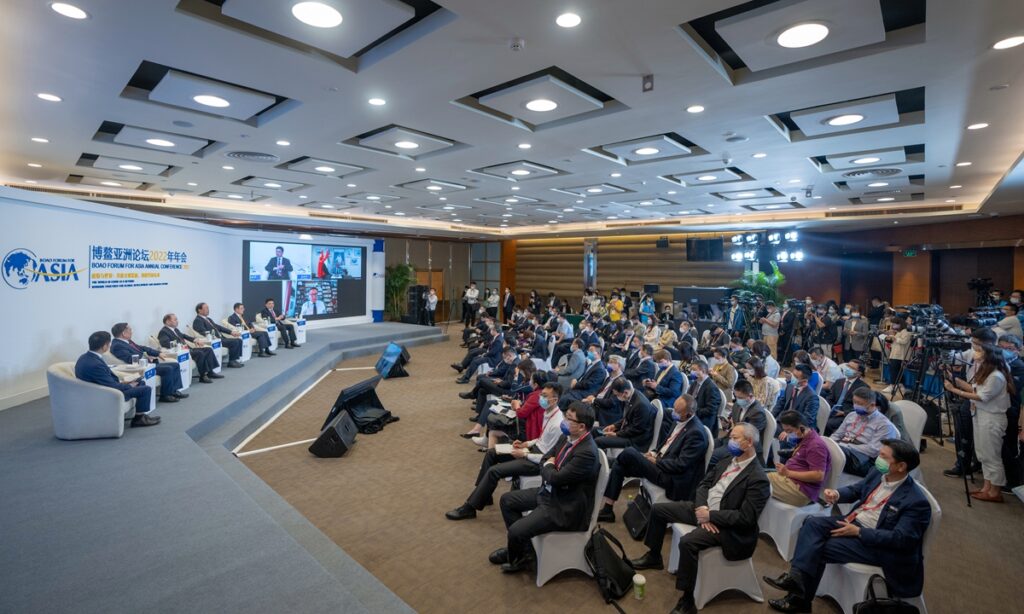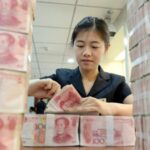China’s commitment to multilateralism and opening-up is reassuring to a world faced with rising security risks, academics and delegates attending the Boao Forum for Asia (BFA) 2022 said on Wednesday, as the international forum amid a new round of epidemic flare-ups in several Chinese cities sends a strong positive message to the world.
The 2022 BFA will be held from April 20-22 in Boao, South China’s Hainan Province, with the theme of “The World in COVID-19 and Beyond: Working Together for Global Development and Shared Future.”
Chinese President Xi Jinping will attend the opening ceremony of the annual conference of the Boao Forum for Asia via video link and deliver a keynote speech on Thursday, China’s Ministry of Foreign Affairs announced on Wednesday.
It will be the Chinese president’s sixth address at the forum. In 2021, President Xi called on all countries in Asia and beyond to uphold multilateralism, embrace openness and enhance the Belt and Road cooperation.
Leaders from Israel, Mongolia, Nepal, the Philippines, Kazakhstan, and Laos, as well as IMF managing director Kristalina Georgieva will also attend the forum virtually.
As the world is undergoing profound changes, the Omicron variant ravaging many parts of the world and the ongoing escalation of geopolitical tensions are putting world economic recovery and sustainable development at bay. Several countries were fighting to be solvent and countries in Africa are already facing grain shortages in the wake of the Russia-Ukraine conflict.
The Chinese Foreign Ministry spokesperson said on Wednesday that the BFA reflects the common aspirations of the international community to win over the pandemic as soon as possible, jointly develop the economy and improve global economic governance.
Determination to bridge world
Chen Yanjun, Director for Annual Conference with the Boao Forum for Asia, told the Global Times on Wednesday the fact that the BFA was held as scheduled in the face of the ravaging epidemic shows the confidence of the Chinese host in preventing cluster outbreaks through strict epidemic prevention measures.
“Delegates and staff attending the forum had to take nucleic acid tests three days before and every day during the forum. Closed-loop management was also conducted during the forum,” Chen said.
The determination to hold this large-scale international forum despite the grim situation shows that China still hopes to make full use of this forum as a platform for communication and exchanges, and provide an opportunity for political and business dialogue in Asia and the world to discuss how to strengthen international cooperation and promote global development in the post-epidemic era, Chen said.
Leon Wang, executive vice president of global drug maker AstraZeneca, told the Global Times at the forum that it also demonstrated China’s firm resolve to expand reform and opening-up and great sense of responsibility through the continued promotion of international economic exchanges and cooperation.
Cao Li, Vice President of the Research Institute of BFA, told the Global Times on Wednesday that against the backdrop of the global epidemic and the complex international situation, Asian cooperation for global development has become a stabilizer of multilateralism and a ballast stone for global economic development.
“Asia accounts for almost half of the world’s economic output and its economic growth is also faster than the rest of the world. With the advancement of regional integration, the Asian economy will play a more important role in global stability,” Cao said.
Guo Yanjun, Director of the Institute of Asian Studies at China Foreign Affairs University in Beijing, said the forum also shows the importance China attaches to neighborhood diplomacy.
“China has been vigorously advocating the building of a community with a shared future for mankind, and China’s neighboring regions, especially the Asian community of shared future, are a pilot area for China to promote the idea. It is also a crucial region for China to achieve peaceful development and promote the implementation of major initiatives and strategies,” Guo told the Global Times on Wednesday.
Through the forum, China can better explain the country’s foreign policy and diplomatic philosophy, and put forward some Chinese plans and wisdom for promoting the world’s economic development cooperation, the expert said.
Cooperation ensures security
Facing unprecedented challenges in terms of the pandemic and international changes, experts and academics said the forum was endowed with a new responsibility in advocating China’s new concept for Asian security that emphasizes a common, comprehensive, cooperative, and sustainable approach.
“There are two main forces in the game on global security. The first is to maintain its own security as the core, to achieve its own security regardless of the security of other countries, even if it sacrifices the security of other countries. On the other side is the new security concept advocated by China, which is supported by most countries as the concept represents new thinking that rejects any Cold War mentality,” Guo said.
Amid the global security turmoil, the forum was given a new responsibility to help China advocate its new security concept, promote the world’s security to a right track and safeguard global stability, Guo said.
Liu Qing, vice president at the China Institute of International Studies, said although the world is facing new security threats such as geopolitics games, food security and a refugee crisis, some Western countries led by the US are still aiming to seek absolute security, draw water to its own mill, engage in clique politics and hype great power confrontation.
“Against the backdrop of spillovers of security issues, the new security concept advocated by China is very important. The forum is a powerful platform to convey that China has always been practicing multilateral cooperation, de-escalation, neighborhood cooperation,” Liu said.
Zheng Yongnian, a professor of political science at the Chinese University of Hong Kong (Shenzhen), told the Global Times at the forum that the Russia-Ukraine conflict and the US-led Western sanctions on Russia have many security implications.
In addition to the proliferation of weapons and even nuclear weapons, the energy and food crisis were emerging, and a more serious harm that China should pay special attention to is some countries’ efforts to dismantle the global trade system, which took many years and global efforts to reach its current status and is now at the receiving end of wanton weaponization of trade.
Issues such as the Western sanctions against Russia, not just against the country but also the Russian people, and the various challenges exposed in different aspects of national security deserve China’s attention and careful thinking, Zheng said.
China’s strength lies in the resilience of its supply chain, Zheng said, albeit such strength mostly exists in the lower- and middle-end of the global value chain. China is more integrated into the global economic system after four decades of reform and opening-up, the professor said.
Since the pandemic, many companies have been rethinking their supply chains amid the fragility exposed under the global pandemic and climate change. Some countries, such as the US, also acted to politicize and weaponize the supply chain issue.
Experts attending the forum said the higher-level of regional integration in Asia stands as a safeguard amid the current supply chain reshuffle, as companies choose to shorten their supply chain, but they still tend to keep their supply chain in Asia.
Over 600 delegates from 42 countries and regions are attending BFA 2022 despite the recent epidemic flare-ups in several Chinese cities including the economic hub Shanghai. Some 700 reporters from 102 media outlets are attending.
A sub-forum of the Boao Forum for Asia (BFA) 2022 on energy and jointly building a green world is held in Boao, South China’s Hainan Province on April 20, 2022. Photo: VCG




